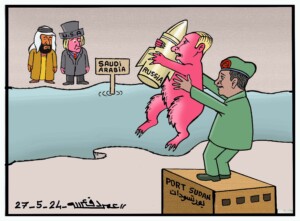Sudan opposition ready for Aug 17 signing ceremony
Sudan’s opposition Forces for Freedom and Change (FFC) has confirmed that the signing of the Constitutional Document for the transitional period between the Transitional Military Council (TMC) and the Forces for Freedom and Change will take place on Saturday, August 17, 2019. Prominent FFC leader Wajdi Salih confirmed this in remarks upon his return from Cairo.
 Negotiations between FFC and SRF in Addis Ababa, July 2019 (Social media)
Negotiations between FFC and SRF in Addis Ababa, July 2019 (Social media)
Sudan’s opposition Forces for Freedom and Change (FFC) has confirmed that the signing of the Constitutional Document for the transitional period between the Transitional Military Council (TMC) and the Forces for Freedom and Change will take place on Saturday, August 17, 2019. Prominent FFC leader Wajdi Salih confirmed this in remarks upon his return from Cairo.
Government sources also confirmed the timeline for the transition in an announcement via the official Sudan News Agency (SUNA).
On his return to Khartoum on Tuesday, Salih said that the FFC consultations with the Sudanese Revolutionary Front (SRF) coalition of armed movements in the Egyptian capital were aimed at discussing the reservations of the SRF on the Constitutional Document.
He stressed that after the review, the parties made sure to include most of the provisions of the Addis Ababa document with accurate legal provisions that had satisfied the SRF to some extent.
Salih expressed optimism that the peace agreement would be signed within two months following the formation of the government. The two sides agreed to continue the dialogue in the coming period.
Constitutional Document
Salih said that the signing of the Constitutional Document, that was signed in initials on August 4, will be attended by representatives of the African Union, international and regional organisations, sponsors and neighbouring countries amid celebrations.
He said that the peace process will start immediately after the formation of the Sovereign Council and the Cabinet with a joint meeting between them scheduled for September 1.
Leader of the SRF Yasir Arman conditioned the SRF’s participation in the signing ceremony with what will happen after the return of the delegation of the FFC to Khartoum and transfer of what was discussed in Cairo to the leadership.
Experts
Experts in administration and governance have called on the FFC to follow scientific means according to the basis of the right choice and the principles of justice and equality for the incumbents during the transitional period.
In a workshop organised by the Human Resources Professionals Association on Wednesday on the methodology for the selection of technocrats in the transitional period, Dr Hatim El Mahdi estimated the top political, technical, and administrative positions in the transition period at 2,000 jobs, stressing the adoption of the criteria of technocrats in the selection of candidates.
Sadig El Tahir said that the Human Resources Professionals Association has launched the Jadarat initiative to contribute to the restructuring of government and civil service institutions, the building of institutions of civilian governance based on competencies, and the development of proven scientific and technical means and tools that enable the selection of the most qualified candidate for the position, assisting institutions of the FFC on the selection of candidates and determining the criteria for selection and the development of scientific preferential methods.
Competencies
Abbas Hussein, an expert on governance and management confirmed the need to design a dictionary to identify the competencies required to be provided to the incumbents of the higher positions and definition and the development of behavioural indicators.
He called for the selection of a team to evaluate candidates for constitutional positions, determine the conditions for nomination, provide a database of candidates and study CVs, prepare a detailed technical report on the CVs, publish the final list of candidates and conduct an assessment to reach the candidate who can implement the ambitious programme during the transition period.
He called to benefit from the experiences of countries in transition similar to what is happening in Sudan.
Political Charter
The SRF has rejected the contents of the Political Charter, a basic power-sharing deal agreed on by the FFC and the ruling Transitional Military Council (TMC) on July 5. Malik Agar, head of the Blue Nile faction of the Sudan People’s Liberation Movement-North, called for a meeting with the FFC in Addis Ababa under auspices of the African Union, to discuss “the unity of the opposition” and agree on “comprehensive security arrangements” in the country.
In the last week of July, the SRF leaders met with a delegation of the FFC in the Ethiopian capital. The parties concluded their talks on July 25 with the signing of the Addis Ababa Agreement in which they agreed “to open the way for a comprehensive peace agreement with the armed movements immediately after the transition to civilian rule”.
On August 3, the TMC and FFC agreed on the 250-pages Constitutional Declaration, complementing the Political Charter. The SRF rejected this document because it does not include the contents of the Addis Ababa deal. Members of the Sudanese Congress Party, an important member of the FFC, supported the claim.
Our editorial independence means that we can continue to provide factual updates about political developments to Sudanese and international actors, educate people about how to avoid outbreaks of infectious diseases, and provide a window to the world for those in all corners of Sudan. Support Radio Dabanga for as little as €2.50, the equivalent of a cup of coffee.












 and then
and then